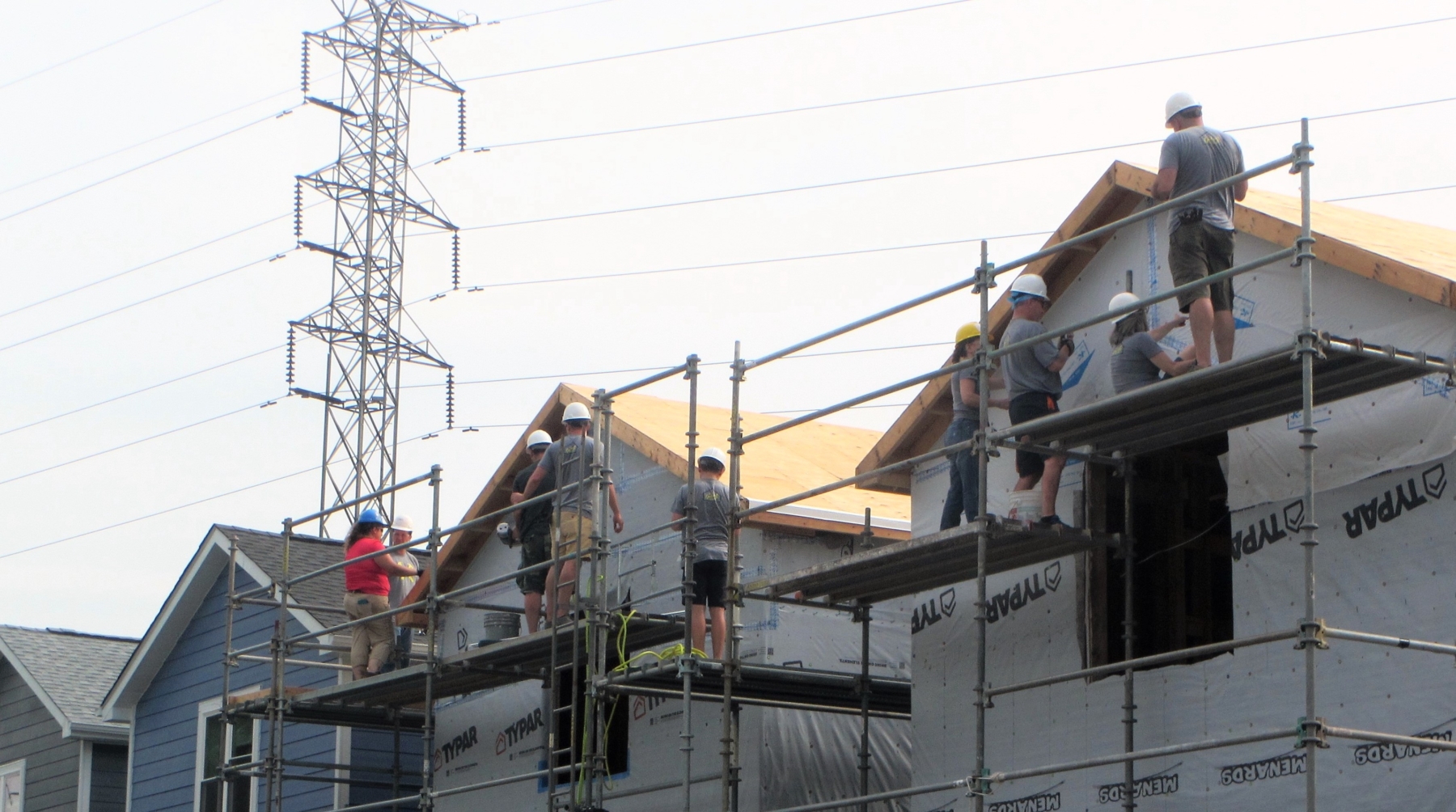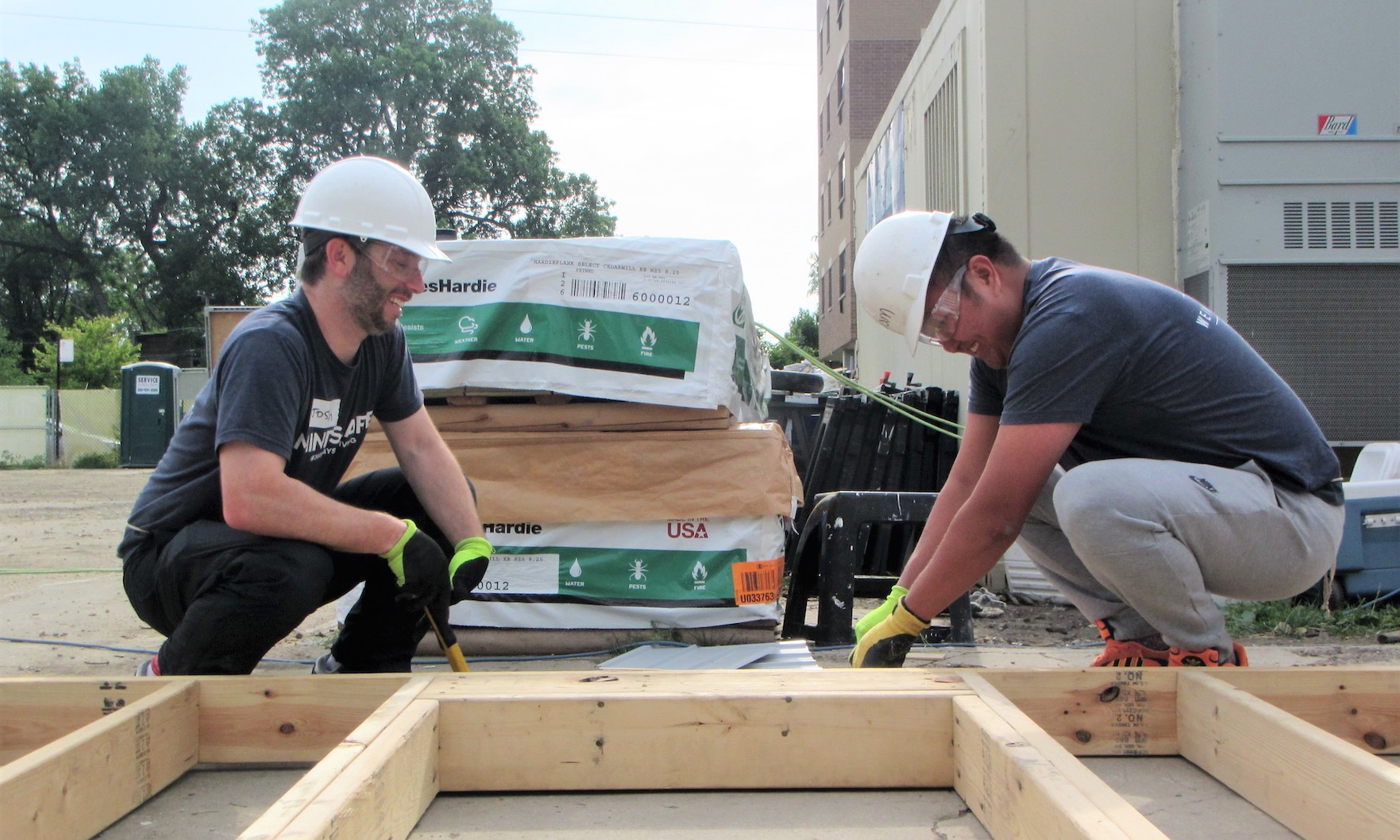While real estate professionals are often well connected with their communities, there are particular causes that tend to call to the industry more strongly than others, and those often involve helping others find their way home.
Habitat for Humanity is a perennial favorite among these housing-related charities, and the affiliate that serves Chicagoland has recently found a new way to connect with the real estate community.

The Baird & Warner team work with Habitat staff. Credit: Habitat for Humanity Chicago
Habitat Chicago just started organizing affinity or industry builds last year, where they partner with specific groups and companies to fill volunteer spots and fundraising coffers for a home the organization is building. Those groups include churches, tech industry professionals and, of course, real estate professionals. Habitat will set aside a day or two a month, and companies recruit anywhere from 20 to 60 volunteers to work on whatever needs to be done on the building in question.
David Chudy, corporate partnerships manager for Habitat Chicago, said working with real estate brokerages is a natural fit for the organization. “Homeownership — that’s what real estate professionals do. They’re invested in creating homeowners in Chicago, and [volunteering with Habitat] aligns with what they do,” he said.
Coordinating with brokerages and teams
Habitat for Humanity Chicago has concentrated their efforts on a select few parcels in the West Pullman area of the city. Chudy estimated that in 2020, some 10 percent of their output will be under the rubric of a real estate build, with one home out of the eight planned in the next year being handled by brokerages and others in the industry.
The Weinberg Choi Residential team at Keller Williams Chicago – Lincoln Park has been participating in Habitat builds for four years now, and co-founder Josh Weinberg characterized the process as easy to coordinate. From the leadership side, he noted that the motive for being involved is twofold. “The industry and the community have been really good to us, and we want to give back,” he said. But also, he noted that “there are a lot of people who want to get involved but they don’t always know how.”
Weinberg noted that Habitat Chicago is very easy to work with and Erik Schwinger, who’s volunteered as a part of the Baird & Warner Winnetka office he manages, agreed. “They do so much of the prep work, and they’ve got this thing down to a science,” he said of the organization.
It’s not just a day of building, either. Participants are also required to raise $5,000 per 15 people to help fund the materials and Habitat staff needed to make the build day happen. Chudy noted that this is sometimes more challenging for the real estate industry, which doesn’t always have the large corporate giving budgets that those in say, the tech industry, might have, which means agents and companies have to raise donations on their own. “There is a lot of fundraising happening — more than other industries — which is exciting because it invests people in what they’re doing,” he said.

Erik Schwinger, center, works with two other volunteers at a recent build. Credit: Habitat for Humanity Chicago
Schwinger explained that Baird & Warner raises funds in a variety of ways. Through their Good Will Network, each office gets a grant that’s funded by agents donating a portion of their commission from every transaction. But also, individual agents are expected to come up with a $250 donation for the build day they’re involved in. “They put their money where their mouth is,” Schwinger said.
Learning the craft
The experience of volunteering at a Habitat build is both a major departure from brokers’ everyday work and a nice dovetail with the profession. “We spend a lot of time around the computer,” Schwinger said. “We sell houses every day, but we never get a chance to actually build them.”
Not only does housing tug at brokers’ heartstrings in a particular way, but also, real estate professionals may stand to gain more from these interactions than the typical volunteer, just based on the fact that they’re in the industry. “That’s one of the things that’s exciting about this project,” Chudy said. “It teaches them a lot more about what goes into building a home.”
While Schwinger said the experience hasn’t made him an expert on home building, he noted that he’s picked up some helpful knowledge along the way, from the required size for lead-bearing walls to the proper way to frame and wrap a window so it doesn’t leak. “There’s no way you can be on a construction site for eight hours and not learn,” he said. “For us to be able to give something back and be involved on a totally different level, it’s really fun and relevant.”
But it’s not just learning how a house comes together. Another key part of Habitat’s industry build days is the direct connection with the future owners of the home that volunteers are helping to build. “One of the things that we specifically provide to the people who are involved in the real estate build is greater access to the people who are going to be moving into the home,” Chudy said. Volunteers get monthly updates on the progress of the home but also the family who will be moving in.
Weinberg said this is one of the things he treasures about being involved in Habitat builds. “It’s nice to see the owners of these homes,” he said. “Seeing how it’s impacting them — that’s what I love the most.”
Habitat requires home recipients to spend 250 hours of their own time on the build site or in the office, in addition to taking 10 education courses. “They’re not just given these homes,” Chudy said. “They work really, extremely hard.”
A group of individuals building as one
Team-building exercises aren’t always at the top of the list when it comes to real estate, where so many are independent contractors with their own schedules and agendas to worry about. But those who have participated in Habitat Chicago’s real estate build days say that’s one of the biggest takeaways from such an event.
Weinberg said one of the best parts of a build day is stepping back to see what the group has accomplished together as the volunteer day comes to a close. “Everyone is exhausted at the end of the day, [but] collaboratively we’re achieving way more than we can individually,” he said. “We wouldn’t be able to have as big an impact on the community” as solo volunteers.
The feeling from the Baird & Warner group is similar. “The feedback from the agents is overwhelmingly positive,” said Schwinger. “It’s a team builder … a really great way to get people involved and working together.”
Interested in volunteering or learning more about how to get involved? Contact David Chudy at david.chudy@habitatchicago.org.
